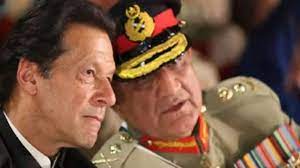Out of favour : On the disqualification of Imran Khan
The military, not Imran Khan, is the real threat to Pakistan’s democracy
The Pakistan Election Commission’s decision to disqualify Imran Khan from completing his term in Parliament is a setback for the former Prime Minister, who has been rallying his supporters against his political rivals as well as the military establishment ever since he was ousted in April. The commission found Mr. Khan, leader of the Pakistan Tehreek-e-Insaf (PTI) party, guilty of illegally selling gifts he got from foreign dignitaries when Prime Minister and concealing the profits. And the four-member bench came up with a particularly harsh judgment of barring a popular politician and the main opposition leader from office, an order that is reminiscent of former Prime Minister Nawaz Sharif’s disqualification in 2018. Mr. Khan would also be prevented from heading the PTI as an earlier Supreme Court judgment bars disqualified leaders from heading political parties. The verdict came days after Mr. Khan swept the by-polls by winning six out of seven National Assembly seats, in a sign of his surging popularity despite the different cases slapped on him. He has challenged the commission’s verdict in the Islamabad High Court, but, needless to say, the development has added to his legal woes. It could threaten his political career and worsen the political instability.
While the legality of the commission’s verdict would be reviewed by the High Court, it is hard to miss the parallels between the disqualification of Mr. Sharif and that of Mr. Khan, barred from office after they fell out with the powerful military establishment. Mr. Sharif always had a testy relationship with the military. Mr. Khan, on the other side, was a beneficiary of Mr. Sharif’s ouster. He rose to power with help from the establishment, and the then opposition which makes up the current government, accused him of being a pawn in the hands of the generals. But the tables turned when Mr. Khan tried to rein in the military. Now, he is accusing the military of conspiring with his political rivals to keep him out of power. Whether he is right or wrong, Pakistan’s history suggests that any popular leader who tries to mobilise political capital independent of the military’s standing would be met with strong institutional resistance. Mr. Khan’s story is no different. Pakistan is in a crisis. The Shehbaz Sharif government is a short-term arrangement; the economy is in free fall; and this year’s floods have made matters worse, leading to growing public resentment. The civilian leaders should assert themselves, strengthen democracy and take the country out of the morass it is in. Instead, their power struggles, under the long shadow of the military, are further destabilising the country.
